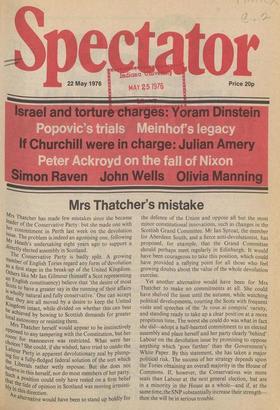Mrs Thatcher's mistake
Mrs Thatcher has made few mistakes since she became leader of the Conservative Party: but she made one with tier commitment in Perth last week on the devolution Z,ne. The problem is indeed an agonising one, following Heath's undertaking eight years ago to support a directly elected assembly in Scotland. The Conservative Party is badly split. A growing number of English Tories regard any form of devolution as a first stage in the break-up of the United Kingdom. thers like Mr Ian Gilmour (himself a Scot representing sn English constituency) believe that 'the desire of most , '13ts to have a greater say in the running of their affairs Wholly natural and fully conservative.' One can accept ut.at --eY are all moved by a desire to keep the United K 'gdom intact, while divided on whether this can best e achieved by bowing to Scottish demands for greater Inca' autonomy or resisting them. nhMrs Thatcher herself would appear to be instinctively ro'lpcsed to any tampering with the Constitution, but her ch°„n) for manoeuvre was restricted. What were her La-ices ? She could, if she wished, have tried to outdo the b cnnt Party in apparent devolutionary zeal by plumpTh....*01: a fully-fledged federal solution of the sort which be?. Liberals rather wetly espouse. But she does not sulleve in this herself, nor do most members of her party. thac.:1 a Position could only have rested on a firm belie! bh, . the tide of opinion in Scotland was moving irresistiJ1xithis direction. 'In alternative would have been to stand up boldly for the defence of the Union and oppose all but the most minor constitutional innovations, such as changes in the Scottish Grand Committee. Mr Ian Sproat, the member for Aberdeen South, and a fierce anti-devolutionist, has proposed, for example, that the Grand Committee should perhaps meet regularly in Edinburgh. It would have been courageous to take this position, which could have provided a rallying point for all those who feel growing doubts about the value of the whole devolution exercise.
Yet another alternative would have been for Mrs Thatcher to make no commitments at all. She could have shelved the issue until the autumn, while watching political developments, courting the Scots with frequent visits and speeches of the `Je vous ai compris' variety, and standing ready to take up a clear position at a more propitious time. The worst she could do was what in fact she did—adopt a half-hearted commitment to an elected assembly and place herself and her party clearly 'behind' Labour on the devolution issue by promising to oppose anything which 'goes further' than the Government's White Paper. By this statement, she has taken a major political risk. The success of her strategy depends upon the Tories obtaining an overall majority in the House of Commons. If, however, the Conservatives win more seats than Labour at the next general election, but are in a minority in the House as a whole—and if, at the same time, the SNP substantially increase their strength— then she will be in serious trouble.


































